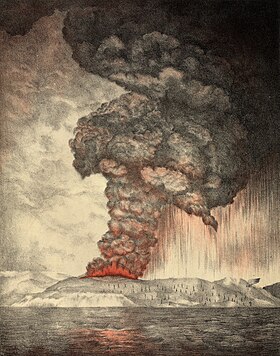Krakatau
| Krakatoa Krakatau |
|
|---|---|

An 1888 lithograph of the 1883 eruption of Krakatoa.
|
|
| Highest point | |
| Elevation | 813 metres (2,667 ft) |
| Prominence | 813 m (2,667 ft) |
| Listing | Spesial Ribu |
| Coordinates | 6°06′07″S 105°25′23″E / 6.102°S 105.423°ECoordinates: 6°06′07″S 105°25′23″E / 6.102°S 105.423°E |
| Geography | |
| Location | Indonesia |
| Geology | |
| Mountain type | Caldera |
| Last eruption | March 2014 |
Krakatoa, or Krakatau (Indonesian: Krakatau), is a volcanic island situated in the Sunda Strait between the islands of Java and Sumatra in the Indonesian province of Lampung. The name is also used for the surrounding island group comprising the remnants of a much larger island of three volcanic peaks which was obliterated in a cataclysmic 1883 eruption, unleashing huge tsunamis (killing more than 36,000 people) and destroying over two-thirds of the island. The explosion is considered to be the loudest sound ever heard in modern history, with reports of it being heard up to 3,000 miles (4,800 km) from its point of origin. The shock waves from the explosion were recorded on barographs worldwide for days afterward.
In 1927 a new island, Anak Krakatau, or "Child of Krakatoa", emerged from the caldera formed in 1883 and is the current location of eruptive activity.
The most notable eruptions of Krakatoa culminated in a series of massive explosions over August 26–27, 1883, which were among the most violent volcanic events in recorded history.
With an estimated Volcanic Explosivity Index (VEI) of 6, the eruption was equivalent to 200 megatons of TNT (840 PJ)—about 13,000 times the nuclear yield of the Little Boy bomb (13 to 16 kt) that devastated Hiroshima, Japan, during World War II, and four times the yield of Tsar Bomba (50 Mt), the most powerful nuclear device ever detonated.
...
Wikipedia

